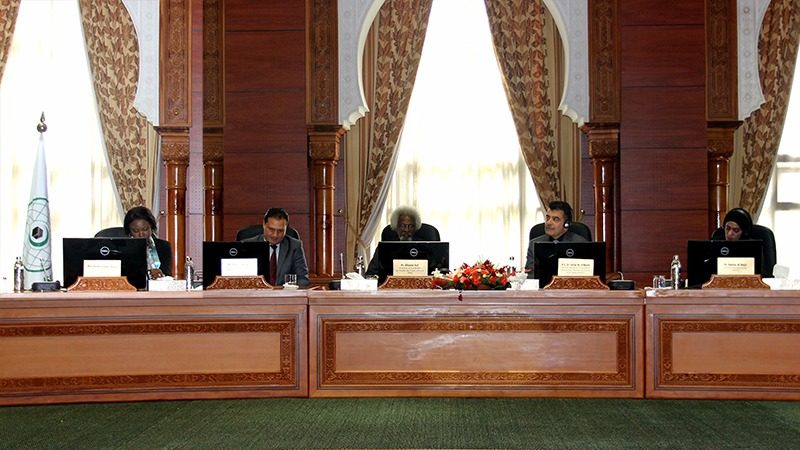
Call for turning to the future at the Meeting on “Social Transformations and Foresight”

5 December 2019
**Dr. AlMalik: ISESCO is keen to benefit from the potential of foresight thought in moving beyond time
**Dr. Sall: strategic foresight has become a survival imperative and not a luxury
The Open Meeting on “Social Transformations and Foresight”, held yesterday at the headquarters of the Islamic Educational, Scientific and Cultural Organization (ISESCO), witnessed great interaction from the audience and a rich debate on the importance of strategic foresight in modern times, which has become a survival imperative and not a luxury according to the guest of the meeting, Dr. Alioune Sall, Founder and CEO of the African Futures Institute (AFI) in South Africa.

At the beginning of the meeting, Dr. Salim M. AlMalik, ISESCO Director General, gave a statement in which he reaffirmed that ISESCO’s new forward-looking vision and strategy requires the anticipation of the future with a scientific approach so as to largely benefit Member States, and added that this keenness is behind the establishment of the Centre of Strategic Anticipation in ISESCO.
In addition, Dr. AlMalik welcomed Dr. Sall, commended the theme of the lecture and stressed ISESCO’s keenness to benefit from the potential of foresight thought in moving beyond time and saving money and efforts through the proactive preparation for future scenarios, which are scientifically anticipated so as to allow the decision-makers to have alternative choices to avoid any uncalculated hasty decisions.

Afterwards, Dr. Kais Hammami, Director of the Centre of Strategic Anticipation in ISESCO stressed the importance of disseminating the proactive culture in the Islamic world.
Dr. Hammami also introduced the topic of the lecture. He highlighted the importance of strategic foresight amid the major social transformations in many countries and regions around the world, and stressed the need to distinguish between strategic foresight and expectation as foresight largely draws upon a calculated scientific method in analyzing the past, monitoring the present and anticipating the future.
Prior to his lecture, Dr. Sall stated that he had explained the theme of foresight and its importance for many times, but the connection between foresight and social transformations (theme of the meeting) was the major stimulus for attending and participating in this meeting as well as his belief in the importance of the role that ISESCO may play through interaction with Member States, which witness big social transformations.
In his lecture, Dr. Sall explained that “the foresight thought exists in the Arab and Islamic history and culture. Times change and many countries have developed. There is no historical inevitability. Only change is constant.”
Furthermore, Dr. Sall stressed the importance of anticipating the future, renewing the production of thought and sciences, and the need to grasp the past so as to understand the present and have the courage to develop conceptions about the future. “We live in the future more than in the present and we cannot live in the past. We need to understand the world where we will spend the rest of our lives,” He added.
Besides, Dr. Sall stressed the need to distinguish between foresight and expectation. “Foresight is based on data, figures and information. Its importance lies in looking far beyond the limits of expectation. Foresight experts and think thanks should help actors of change to develop and follow-up to their work to avoid taking hasty or wrong decisions.” He explained.
Dr. Sall further highlighted that “we should promote thinking capacity, develop minds, and invest in human capacities so as to understand the threats of the future. Such actions are necessary to survive and put an end to dependence.”
In addition, Dr. Sall clarified that there is a disparity, major deficiency and a large gap between countries of the North and the South. “Africa produces 3% of knowledge and accounts for 10% of world population. Knowledge production should be increased. We should have the ambition, promote ethics and assume the responsibility toward the present and the future.”
Dr. Sall also called upon migrant brains to provide their knowledge and expertise to their home countries and invited countries to encourage such contributions, join efforts and work in harmony, stating that Burundi is a successful example in benefiting from its migrant citizens.
Moreover, Dr. Sall talked about the problems of demographic distribution and growth, migrations, unemployment and the multiple foresight scenarios, and stressed the need to identify the needs of societies before initiating any foresight process.

On her part, Dr. Rahmata Almamy Mbaye, Director of Human and Social Sciences at ISESCO, stated that the Organization established the Centre of Strategic Anticipation to propose ideas likely to serve the Islamic world and promote the partnership in building coherent strategies to achieve Sustainable Development Goals.
Dr. Rahmata also highlighted ISESCO’s interest in analyzing social variables and providing opportunities for young people to live in their countries away from the life-threatening risk of immigration.
Afterwards, the guest received and answered the questions of the audience, and admired the discussion.





